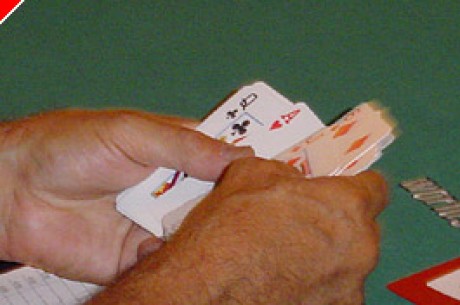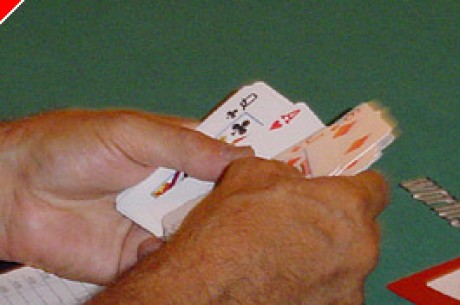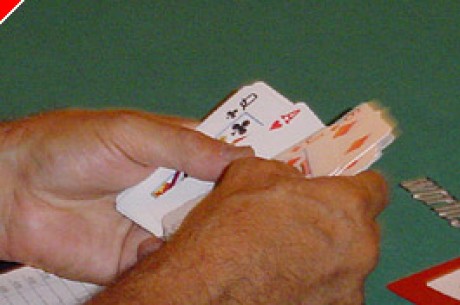Stud Poker Strategy: Time to Go, Part 1

When is it time to leave the poker game? There's a lot of discussion around that topic. I'd like to weigh in.
There are three broad views on this subject. I'll look at each in this column and review their pluses and minuses. I'll end with a brief look at what most people tend to do. In the next column I'll give you my opinion about the best way to decide when it is time to go.
Method #1: Stay as long as the game is good.
This method holds that you should leave only when the game gets bad �C when the players in the game that are better or as good as you make the game unprofitable. This argument calls for staying as long as you can until the game ceases to be profitable.
There's much to recommend this approach �C at least in theory. Since poker is one long game, you want to maximize your time in a game when it is good. You make your money by exploiting your edge over your opponents. As long as you continue to have an edge, why leave?
There's a problem, however, in the application of this method. First of all, there's no way to be sure that you do have an edge over your opponents. How do you decide when the game has gone south and you should leave? Though we good players like to pride ourselves on our ability to size up our opponents, the truth is that no one comes with a sign around his neck saying how good or bad he is.
The other problem is that players do not rank against each other in a linear nor a constant way. It would be simple if every player had a rating as they do in chess or golf. The top player at the table is a 1244; I'm a 1400. So I should stay and play against them because I am the best player. Contrast that with when I'm a 1400 but the other three players in the game are all 2000+. Naturally I should leave. Would that it were so easy in poker.
In truth, players play better in spurts �C and their abilities are not easily measured. One player is generally loose �C but after he has been hammered with big losses for a couple of hours he tends to tighten up and play much better. Also, Al always plays more aggressively when his two buddies, Syd and Evereth are in the game. Syd is in the game and Al is playing a little better but Evereth is coming in. Evereth tightens up with Syd in the game, but Syd becomes a fish when his two buddies are in. Is it time to leave or time to stay?
The other factor that needs to be considered in the above matrix of player interaction is how you are playing. With few exceptions, we don't play with exact consistency. Sometimes we're at our best; other times we're not. Maybe our game improves against some good players; maybe it deteriorates. Maybe we get worse the longer we stay. Though our best self is better than the schlubs we find ourselves playing with, since it's 12 hours since we started, perhaps we're really not good enough to beat them consistently any more. So we are deluding ourselves into think that by staying we're extending a session when we have an edge. That session may have ended six hours earlier when the game was good and we were at our best. Now, though the game is still objectively good, it is no longer good for us because we are not at our best.
And you can add to the list other factors that might diminish our abilities in the game. We may have suffered some losses that changed our style of play. We might be on tilt from winning a couple of huge pots. We might be anxious about the win or anxious about the loss and playing worse because of that anxiety.
The bottom line is that in practice it's tough to just stay until the game gets worse. So players without perfect introspection and self-control might do better to have some other methods of deciding when they should leave the game.
Method #2: Stay for a predetermined period of time.
This method holds that you should plan on staying for a set period of time and then leave when the time is up. There are no variables you have to concern yourself with. Time is immutable and constant. Eight hours is always eight hours. If you view playing poker as a job, why not just play for a set period of time and then leave?
This approach has much to recommend it. It's predictable. It doesn't interfere with regular sleep schedules since you know when you'll be working and when you'll be leaving. Similarly, you can keep a regular exercise regime and diet, since you can plan for your time at the poker table as people plan for their work. Show up refreshed, stay for a set time based on how long you think, in advance, you're at your best, and then go home and live your life away from the table. No guesswork about it.
Players who like regularity embrace this method. They know exactly when they're coming and going. They can make appointments. They don't have to worry that their abilities will diminish over time. It also makes it easier on the non-playing spouse or family member. They can expect you at regular hours. Poker will not interfere with family time any more than a regular job.
But there are problems with this approach as well. The successful poker player must always be on the lookout for the best games. Games aren't always profitable for most of us. It seems to be somewhat of a waste to leave a game that is very good just because one's preset time is up.
Many players like the freedom of setting their own hours. If one treats the hours of a poker session like a job, then how different is playing poker from punching a time clock? In other words, if you can't stay up all night in a good game, why play this game in the first place?
The other problem of playing a set schedule in poker is because your play may not be steady. If you're good at evaluating your own play you might well decide that you are not focused or otherwise playing below par. You might want to cut your session short in such circumstances, rather than remaining at a table when you aren't playing your best.
Method #3: Setting win and loss limits.
A loss limit and a win limit are artificial guidelines that some players use to help them get up from the table. They decide, in advance, that if they are ahead by a certain amount of money that they should leave the game so they don't give it back. Similarly, a loss limit sets an amount that a player is willing to lose before he leaves. Once he hits that mark he ends his session.
There are some advantages to this method. By setting a strict loss limit you prevent yourself from getting stuck more deeply than you think you can afford. You keep yourself from digging into the rent money, so to speak, or getting loaded up with credit-card debt. Similarly, it is psychologically beneficial to leave with a winning session. Reaching your win limit and leaving is a good way of making sure you don't stay until you're broke �C and of maintaining a positive attitude toward your chosen hobby or profession.
The problem with this method is that, as in the time-limited method, you are depriving yourself of the opportunity of exploiting a game that is unusually good. If you've reached your win limit as the result of a game that is great, then why limit your ability to make more money by staying in the game? If your wins are truly the product of your better play, then why deny yourself the chance to continue winning money from your hapless opponents? The next time you come back you may not have the luxury of such soft opponents.
No Method: Leaving based on your gut.
This is the method most players follow. Though there may be some general guidelines about how long to stay, and there may be some general idea of how much you can afford to lose and how much you'd like to win, the decision to leave the game and the poker room is based more on how you're feeling as the night wears on. You know players who are this way �C you may be one of them. You go down with another poker buddy and say that you'll plan to leave at midnight�� or so. Midnight comes and one of you wants to stay�� for a while. And so you do �C until 5:00 or 6:00 in the morning!
This is, in essence an informal win/loss limit system that players come up with while they're at the table. They don't set firm win and loss limits or time limits but they do base their decision to stay or leave on how they are doing. Generally speaking, players who leave or stay based on how they're feeling about their wins and losses at the table tend to leave with wins that are too small and losses that are enormous.
Most poker player abhor the idea of a loss, any loss. If they are down their first and most important goal is to make sure to at least get even. So they vow to stay, no matter how bad the game or how tired or distracted they are, until they at least come back to even. This becomes their mantra. And so they do stay. As they do, they often compound their problems by making poor playing decisions, based on their low emotional state. So they dig deeper into the red until they are completely broke and must leave, feeling completed deflated and defeated.
But if they win early on, rather than use their improved table image to really take advantage of the game and press their advantage, they get concerned that they may well lose it all back. They focus on how they want to leave with a win. And so they tighten up, and often shorten their session �C insuring that they win �C no matter how small it is.
Next Column: The Best Method








